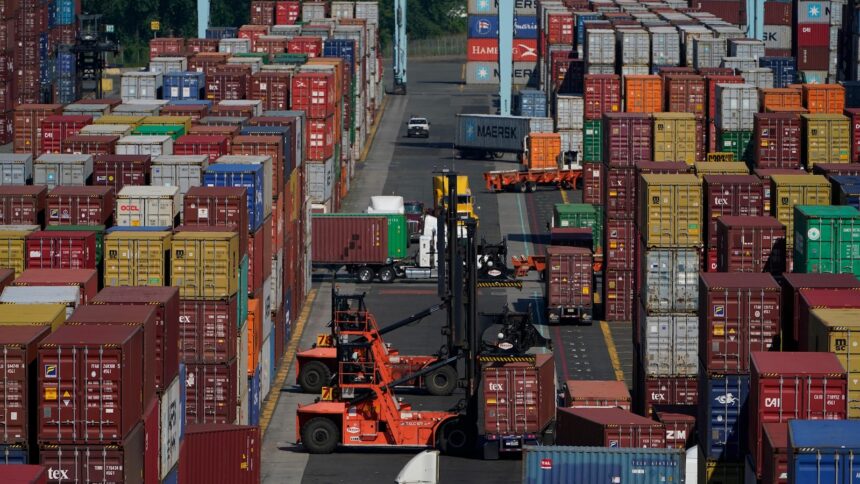With dock strikes threatening to shut down ports on the East and Gulf coasts starting this week, Chris Butler is worried.
Butler is the CEO of the National Tree Company, and, like many businesses, he counted on shipments coming from Asia but not arriving at the port before the longshoremen’s expected strike starting at 12:01 a.m. Eastern time Tuesday.
The company, based in New Jersey, is an importer of artificial Christmas trees and other holiday decorations. If the strike lasts only a few days, there may be time to unload the trees, transport them to the warehouse and have them ready for customers this season.
But if the strike were to close the port until, say, November, about 150,000 trees might not arrive in time for the shopping season, which would cost National Tree and other businesses. In a worst-case scenario, these costs, doubled in the industry, could lead to inflation and pressure on the US economy.
“It’s definitely not an ideal situation,” Butler said.
National Trees collects or ships most of the approximately 2 million artificial trees sold each year. But it will lose revenue if 150,000 trees get stuck in the pipeline.
Other businesses face a similar predicament, with goods potentially stranded at sea if the 45,000 members of the International Longshoremen Association make threats to strike. They could close 36 ports from Maine to Texas that handle about half the goods shipped in and out of the United States. (The West Coast dock workers belong to a different union and did not participate in the strike.)
A long strike would force companies to pay shippers for the delay, and items could arrive late during the holiday shopping season. On Friday, a top Biden administration official met with port operators and told them they needed to negotiate with the union before Tuesday, according to a White House official who spoke on condition of anonymity to discuss the ongoing meeting.
Butler said he was hoping for an agreement or government intervention to stop the attacks. But the US Maritime Alliance, which represents shippers and ports, and the longshoremen’s union have not met since June. And no talks are scheduled.
The union is demanding higher wages and a total ban on the automation of cranes, gates and movable containers in the loading and unloading of goods.
The Toy Association, the nation’s leading toy trade group, is among about 200 organizations that asked President Joe Biden in a letter this month to work with both sides to reach an agreement. The National Grain and Feed Association also called on Biden to take action to prevent the strike, which is expected to come as the harvest season begins.
The directive puts Biden and Vice President Kamala Harris, the Democratic presidential candidate, in a sensitive position: Both are seeking union support and don’t want to be seen as forcing longshoremen to reach settlements. But if the full strike results in shortages of consumer goods or high inflation, it could cost Harris votes in the November election.
Under the Taft-Hartley Act, Biden could seek a court order to suspend the strike for a period of 80 days. Robyn Patterson, a White House spokeswoman, said in a statement that the administration had never taken such action and was not considering it now.
Biden and Congress acted two years ago to block freight rail strikes and force the workers to accept a deal out of fear that rail strikes would damage the economy.
Alex Hertel-Fernandez, an associate professor of international and public affairs at Columbia University who served as a Labor Department official under Biden, suggested that the administration would follow the playbook used in negotiations last year between West Coast ports and unions there: Mediating negotiations without direct intervention.
Greg Ahearn, CEO of the Toy Association, said the strike will occur at a critical time for toy sellers and manufacturers: Up to 60% of annual sales occur from October to December. Although some toy companies are shipping items ahead of time, Ahearn said the strike will make it difficult to replenish items that sell well.
The strike, he warned, could raise the price of toys “based on scarcity and increased costs.”
At National Tree, Butler and his crew began preparing for a strike in July. They speed up the delivery for everything they can. But one major retail client, he said, requested trees early. And so far, factories in China and elsewhere have been unable to produce the rest of the National Tree orders.
A ship containing trees is on its way to New York but will not arrive before Tuesday. A prolonged attack, Butler said, will force most trees to be warehoused until next Christmas season.
The longshoremen’s strike will further disrupt global supply chains that have already suffered a slowdown due to Yemen’s Houthi rebels’ attacks on commercial shipping. The attack only shut down the use of the Red Sea and the Suez Canal, said Jonathan Gold, vice president of supply chain and customs policy at the National Retail Federation. The attack forced longer transit times for ships that had to navigate the Cape of Good Hope to reach East and Gulf Coast ports.
Dock workers’ strikes, Gold said, could prove more damaging than the pandemic-induced port congestion in 2021 and 2022, when cargo is allowed to move, albeit slowly.
The eastern port can stop. Emas noted that operators have announced additional charges on containers to address potential disruptions, a trend that could boost inflation.
Many retailers may find it difficult to charge customers more to cover these costs. The most vulnerable, Gold said, are small businesses that do not import directly and do not have the financial resources to meet the higher costs.
Shippers may direct some cargo to West Coast ports. But the port cannot absorb the additional cargo. The Port of Los Angeles, for example, moved 960,000 containers in August — about 80% of capacity — said Gene Seroka, executive director.
The major Western railroads, Union Pacific and BNSF, have increased system capacity to handle more freight as imports increase. Eastern Railway CSX and Norfolk Southern said they could move cars and crews to handle more freight coming to Chicago from the West. But it is not clear how the railways can manage it.
In any case, Butler said, it would be too expensive to ship trees across the country by rail.
Taylor Green, co-founder of the landscaping company Artificial Grass Solutions in Los Angeles, which imports artificial turf, said he buys 25% more turf than usual to ensure there will be enough for the client’s project. They are also making arrangements with alternative suppliers if the attack continues indefinitely. If that’s the case, Green said, a price increase would be necessary.
Still, like some larger retailers and manufacturers, Artificial Grass says it’s better prepared for shortages than during a pandemic.
“We’ve learned to be proactive rather than reactive,” Green said.
____
Associated Press writers Anne D’Innocenzio and Mae Anderson in New York, Josh Boak in Washington and Josh Funk in Omaha, Nebraska, contributed to this report.




